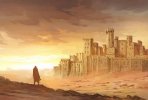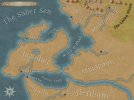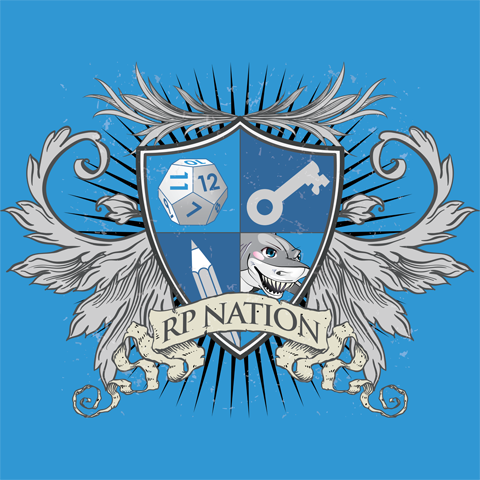Meatball30
Ball of Meat
Sheikhdom of Mekhallah, along the border of the Jalema Sultanate
44 years After the Sultan's Coronation
44 years After the Sultan's Coronation
The grandfatherly man's voice was uneasy as the stranger entered his modest caravansary, tracking in sand and a chilly desert wind at their heels, but he couldn't hide the relief of finally having a customer.
The stranger that entered cast a brief glance about the ramshackle outpost while shaking loose sand from his shoes and straightening his kaftan. He could tell the roadside refuge he'd stumbled into was little more than the husk of a brighter establishment, eerily illuminated by moonlight piercing through thin gaps in the shuttered windows. Aside from the stranger and the innkeep, the caravansary was occupied only by empty chairs at empty tables, their sandstone tops dusty with disuse, much like the colorful fabrics which hung to cover otherwise bleak adobe walls. The stranger took a seat in an uncomfortable chair at the nearest table, a worn cushion attempting in vain to improve his luxury.
"You're the first to come through in some time. I'm sure you can see," the owner chuckled, his voice shaky with age. "Is it a rare beauty or a fool's errand that brings you to Alkhafat?"
Fumbling about behind the bar for an uncomfortably long period, the old man produced a ceramic jug, which the stranger could tell from the scent was filled to the brim with arak. Finally shuffling over from behind his counter, the stranger repressed a gag as the spirit's scent mingled with the old man's distinct musk. The keep was just as decrepit as his establishment, the deep-set wrinkles marring his olive complexion and dragging his face towards the floor, much like the faded green cloth of his haphazardly wrapped turban.
The old man poured a full cup of araq for his guest, the stranger nodding and lifting their drink in thanks. "Thank you, uncle. I prefer to keep my business as my own, meaning no disrespect."
Shuffling to the seat across from his guest, the keep gave his feet a rest. The stranger could swear they heard the old man's back snap in two as he lowered himself into the chair. The innkeep didn't seem to mind his non-answer.
"The first drink is free... Once this place was 'The Frontier's Gem,' can you believe it!" the keep mocked harshly, shaking his head. "If your business isn't urgent, I suggest you turn back soon."
The stranger, humoring the old man's clear lust for conversation, took another sip of his arak and leaned forward, resting his elbows on the stone table. "Tell it true, uncle. Is it as bad as we hear? There've been tales, traveling south with starving mothers and withering widows..."
"Worse," the elder said, leaning forward with some effort to meet the younger man's eyes.
The stranger couldn't help but feel perturbed as the keep's haggard brown gaze locked with his own. He could tell it had born witness to suffering, decay, death.
"The Waste is already here, Nafayat al-Hayya! And every day it's getting closer, a stalking lion. They say it's 100 miles north of our city. Farmers are plowing little more than dust and dunes. The Hooved Ones tell tales, too. No matter how far they ride, the mountains are crumbling at their very foundations, worn down into sand."
A long gust of wind whistled through the window cracks then. The stranger felt a chill roll down his spine.
"People are leaving, the ones that can afford it. There's no money here. The few fields we have still producing crop at all are needed to feed our city. They say that, for now, we can survive and scrape by. We're being punished," the old man declared, leaning back in his chair as if the tirade exhausted him. "Crime, immorality, degeneracy. The heavens have had enough."
"What will you do, uncle?" the stranger asked, likewise leaning back into his seat.
The keep parted his cracked lips slightly, revealing a set of teeth sporting the same decay he claimed befell his city. "Welcome hardheaded travelers like you, as long as I can turn a profit."
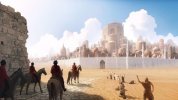
Welcome, traveler, to the Sheikdom of Mekhallah. The far northeastern province of the wider Jalema Sultanate, the people of Mekhallah have long embraced their reputation as rugged, resourceful, and determined. According to local legend, the sheikdom was first founded 300 years prior when a scout of the Sultan's army was sent to chase down an enemy messaging bird after a bloody battle, for fear the fowl would summon a greater army. The scout managed to shoot the bird in flight from distance, and when he attempted to recover the corpse and message discovered a massive camp of the Horned Folk nestled in a beautiful oasis. The Sultan's armies would later relay this report, and a large-scale campaign was launched to dislodge the Horned Folk from the region and settle a city along the river valley.Despite the sheikdom's distance from the Sultanate's capital, the people were able to enrich themselves by exploiting the area's abundant natural resources -- primarily fine gemstones, high-quality metals and the fertile lands of the river valley. The sheikdom's capital, Alkhafat, became one of the largest cities in all the Sultanate. The Sheik of Mekhallah was a coveted position, and was trusted to be both a shrewd negotiator and capable defender against the native Horned Folk and their more beastly cousins, the Hooved Folk to the north, inhabiting the desert that was then simply called The Great Waste.
Approximately 70 years before your tale begins, The Waste began to slowly expand. It was barely noticeable at first, but the Sultanate's border protectors and elite soldiers, the Sand Striders, were among the first to chart its growth. Since then, the Living Waste has grown southward, butting up against the mountains that mark the Sultanate's northern borders and encroaching deeply into Mekhallah. Whole villages have been abandoned as the land around them seems to wither away and die, ground into sand by the unstoppable march of the Waste's dunes.
Over the years, the Sultan has sent scholars, magi, and holy men to investigate to no avail. Now, the Sultanate has not been in contact with Mekhallah for several months. Officials are beginning to suspect the Sultanate has abandoned their sheikdom, and troublesome rumors of looming war and mass hysteria in other cities across the country create further unrest as the remainder of the Sultanate bears witness to Mekhallah's slow decay. Citizens of Mekhallah are rightfully worried. Many have begun to emigrate, some turn to crime, and still others spend their days praying for salvation.
The Sultanate, still a young and recently unified empire, seems poised to burst at the seams, back into the disparate Sheikhdoms that ruled the region for centuries before. That process may be stopped, or hurried along, starting in Mekhallah.
Your tale likely begins in or around the sheikdom's capital city of Alkhafat, still a fairly large city of over 40,000, a metropolitan melting pot of races and religion, and formerly one of the busiest trade cities in the Sultanate. As you and your family or other companions attempt to navigate this new reality, and make decisions on what to do next, the city is set to receive an unexpected visitor...
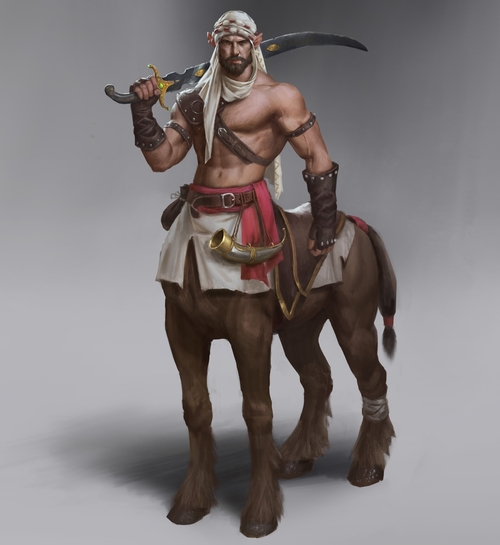
"The Hooved Folk" | Nasrifaq
Referred to as the Hooved Folk exclusively by the residents of the Sultanate, the Nasrifaq are a people native to the lands north of the Sultanate, dominated primarily by The Living Waste and other dusty badlands. While not a common sight in Mekhallah, some have been known to settle along the sheikdom’s borders. The Nasrifaq are regarded with varying degrees of fear and suspicion by the sheikdom’s human denizens, and are almost universally prohibited from owning property in the sheikdom. Some may go as far as refusing to trade with them, as a stigma of heathenistic spirits, devil worship, and black magic follows the Nasrifaq throughout Mekhallah.
The race's origins are unknown, and their population is low. Some suggest they descend from barbaric beastmen who lay with their horses, others still claim they were formed through a heathen ritual, performed by a criminal wishing to flee more swiftly from the Sultan's armies. Whatever the case, the Nasrifaq were here long before human settlers arrived with the Sultan's armies, but never lay down a permanent city in the area. They have spent the last several centuries sometimes raiding the small outpost settlements that hug the edges of the Living Waste, clashing with the Sultan's Sand Striders often. Despite their remarkable endurance, the Nasrifaq have also been hard hit by the Living Waste's growth, as the distance they must cover to cross their desert continues to grow and oases disappear.
Though they are nomads, the various disparate tribes hold a strong sense of unity. Leaders are elected in a rough democracy, with as many tribes as possible congregating at an unknown (to the Sultan's scholars, at least) location in the Living Waste. Once gathered, the various elders hear arguments and discuss amongst themselves who should be appointed that tribe's new leader.
While obviously physically strong and swift warriors on open field, they also hold a special reverence for musicians. Much of their worship is carried out through song and chants.
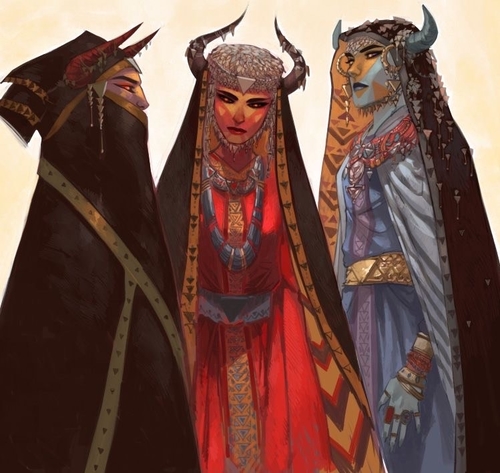
"The Horned Folk" | Alrifaq
The indigenous inhabitants of the Mekhallah region, the Alrifaq are even fewer in number today than the Nasrifaq, never having recovered from the decades of armed conflict that resulted in the Sultanate's conquest of Mekhallah. With origins just as perplexing to the Sultan's scholars as the Hooved Ones, the Alrifaq share in their bestial aspects, though with greater variation. Some Alrifaq can be born with plainly visible horns, some with hooves instead of feet, while others can be born almost completely human save for a small bumps on their heads. A superstitious people who live in small, permanent communities around the outskirts of Mekhallah, many of the few remaining Alrifaq are struggling with whether to flee their race's homeland or remain at the mercy of the Living Waste's unyielding advance.
The Alrifaq are exceptionally religious, adherents to a faith they call Dzho'Drakt, translating roughly to "Duality" or "Mirror." They pay homage to the stars and moon when the moon's phases are waxing towards full, and revere the sun and earth when the moon begins to wane out of sight. Many often paint their bodies daily, using warm reds and yellows when the moon is waning as opposed to the blues and greens employed when the moon is waxing. They dress modestly, with both men and women covering themselves in layers of beautiful fabrics, which are highly sought after by the Sultanate's elite.
Aside from their beast traits, the Alrifaq appear to be plainly human. Their creation myth holds that they were the result which sprung from the earth when moon and sun were once in the sky together, in perfect harmony. This balance, they claim, provided the perfect conditions for the night and day spirits to mingle and create a race tightly bound to the earth it inhabited, an ideal mixture of humankind and nature.
The Alrifaq are typically well-respected in the Sultanate, despite their cultural distance from the majority of its residents. It is not uncommon for them to hold positions of authority in the military and civic realms, and they are often sought after as strategists and advisors due to a general level-headedness which permeates their culture.
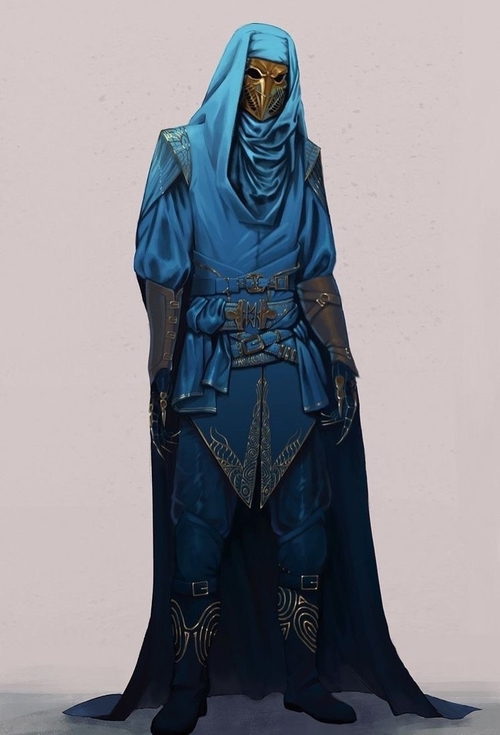
Elite Troops | Sand Striders
The respected order of border protectors widely known as the Sand Striders are more formally reffered to as the Knightly Order of Muhari Alduud, named in honor of their founder. A fairly recent addition to the Sultanate's armies, the Sand Striders were officially formed 250 years ago when then-general Muhari Alduud led a desperate defense of Mekhallah's frontier against a horde of Hooved Folk intent on sacking Alkhafat. Alduud's forces emerged victorious, but of the 5,000 that went to battle, only 700 survived the bloody combat.
Becoming a Sand Strider is among the highest honors in the Sultan's armies. Initiates on average have served a decade already, but even lowly footmen who display great prowess and valor in the field can be fast-tracked into the order. A highly unconventional force, the Sand Striders are expected to become masters of horseback archery, riding, mounted combat, tracking, and survival in the wastes. As the protectors of the Sultanate's borders, they most often come into conflict with the Hooved Folk and, very rarely, roving bands of wild men who raid border villages for food before disappearing into the wastes.
They are immediately recognizable by the beautiful blue fabrics they wear over their armor, the hue of the Sultan's banners. Another common nickname for the Order is the Turquoise Horde, often used by the Hooved Folk as a term of respect. They maintain regular patrols along border outposts, but unlike typical footmen, are given great freedom as far as equipping themselves.
Their presence close to Mekhallah has increased in recent years as the Waste expands, and hostile groups of Hooved Folk are taking advantage of their retreat, occupying former border outposts now lost to the sands. They have been asked to scout into the Waste to search for the cause of its rapid expansion, to no avail. Recently, some Sand Striders have taken to worshiping a strange figure they call the Daughter of the Sands.
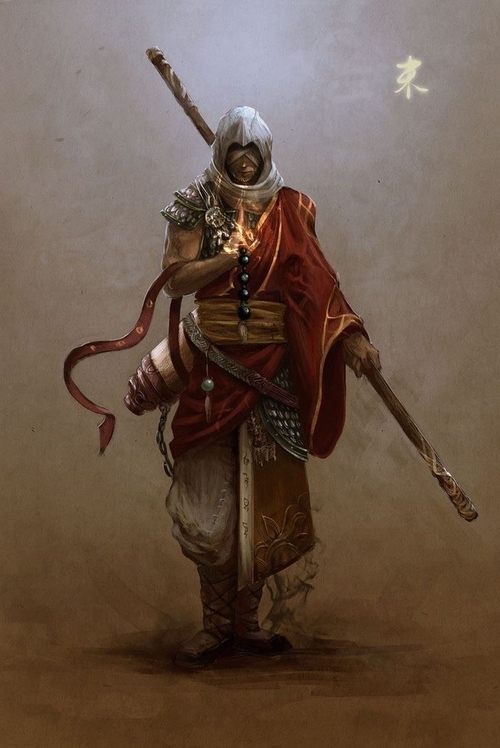
Heaven-touched Mortals | The Sultan's Magi
Considered the foremost -- and only officially sanctioned -- authorities on magic in the Sultanate, the Sultan's Magi are a small group of magic users who use their abilities to advise the Sultan, defend the Sultanate or otherwise advance the nation's interests. In practice, however, the Magi as an organization are very rarely unified. Most often factions of like-minded mages set their own agendas on what to study, how to go about it and when to actually advance the Sultan's wishes. At present, the Magi are perhaps more fractured than they have ever been historically, as the looming disastrous desertification of the entire Sultanate seems inevitable. The order currently numbers around 150 mages spanning the Sultanate.
There are three academies where individuals can study magic unhindered across the Sultanate, all of which are essentially impossible to enter without first having magical ability, and also having the good fortune to be wealthy enough to pay for the education. None of these institutions exist in Mekhallah, being centered in the Sultanate's richly developed Southeast. Efforts to expand possibilities for magically-capable low born citizens have gone nowhere in the past, but as of now a splinter fragment in the Magi is making a push to find and educate low born magic users, arguing that the Sultanate will need every available hand to fight against the Living Waste.
The Magi are closely linked to Tebala, and magic use which derives power from the daylight is looked on with suspicion and disdain, but not outright banned. Most of the Magi's members rely on moonlight magic, giving them the ability to manipulate freezing desert winds both by moving and utilizing the air itself, and creating frost, snow, and ice. Those that utilize sunlight magic are able to manipulate the desert sands, other earth, and create fire.
Although they are expected to closely work with the Sultanate's government, Magi are given the freedom to travel for study and research. Every Sheik in the Sultanate has an assigned Magi, but the assigned Magi are rarely the best available, as the more senior members of the order prefer to remain independent and pursue their own interests.
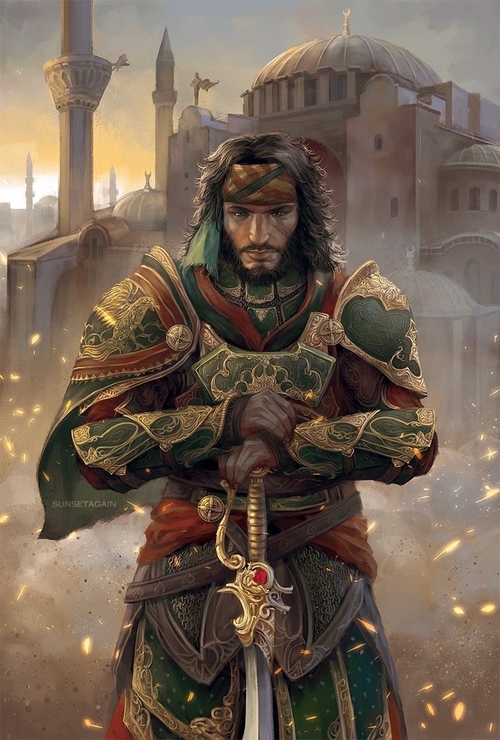
Selfless River Warriors | The Jai-Anar
The Jai-Anar are a group made up of low born sons seeking adventure, daughters looking to escape arranged marriage, and any other citizen of Mekhallah looking for a way out of a typical life. The group was founded by a former sailor and merchant, Zufar al-Siddiqui, though few know him by name. His moniker, River Drake, followed him from a land far across the seas, where he says he learned from pale men who battled across their land's mighty rivers in great war canoes. The River Drake learned how to build these canoes after surviving a shipwreck off the coast of this distant island and being rescued from death by local traders.
The River Drake was without work or a way to support himself in the strange land, but was offered a job by the traders who rescued him. If he could wield a sword, they said, he could earn a way back home by serving as a sellsword along their country's many great and broad rivers, which were the primary trade routes in the region. Additionally however, the shores in between large settlements were thick with jungle and hidden coves, which serviced river pirates who had recently begun to prey on unguarded fleets.
It is unknown how long the River Drake was in this unknown region, but he eventually returned and traveled to Mekhallah with his knowledge. With the continued expansion of the Living Waste, overland trade routes have become rare, and those that still travel are also targets for roving bandit groups that have formed from impoverished residents of Mekhallah seeking a way to survive. The Jai-Anar originally formed as a vigilante gang of sellswords protecting caravans the Sultan's Army could not or would not.
Soon, as overland trade to Mekhallah began to dry up, bandits in the sheikdom took to river raiding. The River Drake and the Jai-Anar would eventually transform their primary function into what they are today -- a group of well-intentioned mercenaries who sail Mekhallah's wide Qaara River on strange war canoes, offering protection to merchant shipping and rooting out bandit encampments.
The Jai-Anar are a small band, numbering about 100 members and seven canoes constructed with the River Drake's guidance. They have a presence all along the Qaara River, which flows through Alkhafat, and often unofficial patrols along the river's edge stumble criminal encampments. The Jai-Anar and the River Drake have become local heroes in the decaying sheikdom, but as more and more merchants begin to leave the city their purpose becomes less clear.

Sharp-eared Mystics | The Shrouded Star
Though many in Mekhallah believe the Shrouded Star is another religious group serving a strange god, its founders and members are a mosaic of faiths and races. Headed by two women, a human and an Alrifaq, the Shrouded Star operates on the surface as a group of couriers, messengers, guides for foreign visitors and fortune tellers. While it may be due to its founders being lowborn women, one of whom is an Alrifaq Dzho'Drakt follower, there remains some general distrust of the Shrouded Star among the wealthy.
The Shrouded Star reserve membership exclusively for the destitute and downtrodden, allowing a near-guaranteed income for those willing to join their ranks. The Shrouded Star is considered a key part of keeping Alkhafat's poorest families afloat, as the income awarded through guiding new visitors both inside the city and around its outskirts is invaluable. Even more lucrative is the service offered by some in the organization as fortune tellers, who read coffee grounds and tea leaves to divine the futures of many wealthy tourists and distraught locals.
The Shrouded Star gained their reputation and folklore early in their existence. Founded several decades before your tale begins, muggers who targeted citizens being escorted by a member of the Shrouded Star had a strange habit of turning up dead or restrained later in the same day, and the stolen goods were almost always reliably returned to their owner.
Beyond their obvious employ, the Shrouded Star serve as faithful local informants. Throughout their duties they often converse with various people and overheard interesting things, all of which are worth something to someone. While the Shrouded Star very rarely directly involve themselves in anything criminal, they can unofficially serve as a source of information for local law enforcement and petty thieves alike, for a fee.
To the more superstitious in Alkhafat, the Shrouded Star are able to manipulate the future and walk between planes to discern possibilities of a given action. They are easily recognizable most times by the spherical lanterns they carry, which are rumored to emanate a warding magic which repels thieves and other cutthroats. Their fame, rumors on their power and reliability in their humble task extends beyond Mekhallah, which is why visitors often hire a guide out of tradition and curiosity. Locals also pay their respects often by hiring a member of the group, especially in more dangerous areas of the Alkhafat.

The Sultan's Worship | Tabala
The majority religion of the Sultanate, Tabala as a faith has its roots in the far southeast, in the Sultanate's capital city of Tawira Mundh, where it was founded 700 years before the start of your tale by the Lunar Mantle Haral Musiah. The religion heavily reveres the moon and stars, as it is believed these are the gateways the multitude of spirits and divine entities use to reach the mortal plane and communicate their desires to humanity.
Tabala's adherents believe the movements of the stars and moon can be used to foretell great prophecy and smaller omens, and becoming one who charts the stars is a great honor. Followers pray only at night, and many of their rituals involve imbibing hallucinogenic substances and performing ritualistic dances, during which it is believed worshippers will be able to divine spiritual messages in the night sky formed from stars.
There is no singular deity in Tabala, as every star is treated as an individual spirit, with some of the more prominent stars in the night sky being elevated to "higher spirits" referred to as "Shayamun." The moon is closest thing considered a "chief" of the Shayamun. Since it is believed that the Lunar Mantle Haral Musiah was the moon given form, he is held in high esteem rivalling that of the moon spirit itself. Since the Lunar Mantle's appearance, children with pale skin, pale hair or white eyes have been considered exceptionally blessed. These mutations are rare, but still occur in the modern day. Most often, the children are shipped to Tawira Mundh to serve as seers and advisors for the Sultan, with varying success.
Daytime prayer is considered a great taboo, as it is believed demons crawl out of the sun to spread their influence in the mortal world. Many travelers and caravans avoid the roads during the sun's peak hours if they can afford to, as do the Sultan's armies, preferring to march at dusk, dawn or night by the light of magi's lanterns.
While traditionally there is no organized institution overseeing Tabala, the Sultan has begun summoning particularly influential local spiritualists from across the Sultanate to form a proto-clergy overseeing important matters of magic and faith.
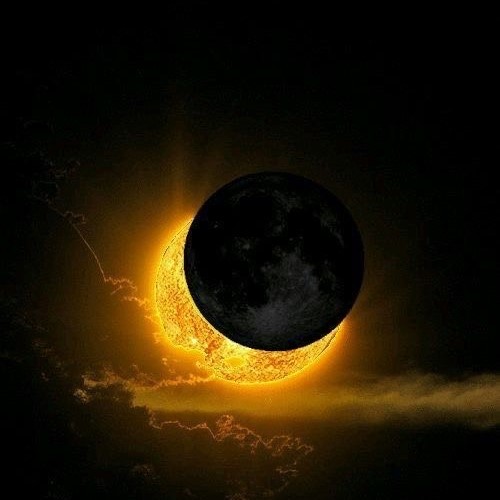
An Ancient Way | Dzho'Drakt
The religion followed by most of the remaining Alrifaq, Dzho'Drakt translates to the Sultanate's common tongue roughly as "Mirror" or "Duality." The Alrifaq of Mekhallah's river valley long revered both the sun and the moon in equal parts throughout the course of the time, depending on the moon's phases. Followers pay homage to the stars and moon when the moon's phases are waxing towards full, and revere the sun and earth when the moon begins to wane out of sight. Many often paint their bodies daily, using warm reds and yellows when the moon is waning as opposed to the blues and greens employed when the moon is waxing.
While the Alrifaq are the primary wardens of this dying faith, some humans in Mekhallah have begun to convert, with more doing so as the Living Waste continues to approach the Sultanate.
Dzho'Drakt holds that the sun and moon are both worthy of worship, and are in fact a pair of sisters who once inhabited the skies together long ago. When a great sandstorm covered the mortal world in dunes for thousands of years, the two sisters were blinded and lost their way in the skies. Since then, they have been circling the skies in search of each other, but are always just a few steps behind one another.
Worship rituals often involve traditional, solemn prayer and lighting strongly scented torches, which are intended to catch the attention of both sun and moon and draw them together at last. Followers believe once the moon and sun are reunited, the world will return to its previous ideal balance to bring lasting peace and return the souls of the Alrifaq killed by the Sultan's men to earth. Followers also revere the natural world, which is said to contain energy from both the sun and the moon, and to which the Alrifaq are strongly bound by their beast traits. The most devout followers take a pilgrimage to Barazhyr at least once in their lifetimes, the highest peak along the mountain range on Mekhallah's northern border. The mountains are considered sacred platforms through which one draws themselves even closer to the sun and moon.
Their belief in the previous state of ideal balance has led their culture to conserve the river valley's resources where possible, and the Alrifaq villages are often carved into the sides of mountains or near the bottoms of cliff faces in adherence to this belief. Wildfires are considered terrible omens, and a strict tenet holds that one must find a way to replace what is taken, if possible.
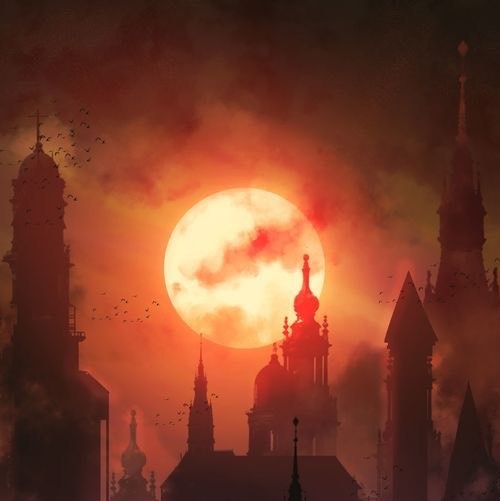
Praise the Sun | Qariqism
Just a few centuries older than Tabala is Qariqism, founded around 1,000 years before your tale begins. This faith features the solar spirit called Qariqadouk, revered as bringer of life and a shield against the evils worshippers say lurk in the dark -- murderers, bandits, thieves, and supernatural creatures alike. This is the faith of the Nasrifaq, entrenched in the Sultanate's northern sheikdoms after centuries of intermittent raids and semi-permanent settlement by the Hooved Folk.
While they primarily revere the sun, the moon also holds a place in Qariqism, as a representation of the day's slow march towards victory over the night. Worshippers believe it is destiny that they help bring about an eternal day, and that the moon's light is a reflection of the sun slowly piercing through the inky black night sky. They use pyramidal, prism-like gems as the centerpieces of their temples, which are constructed with great glass domes. Their temple walls are scrawled with scripts from their holy book, also called the Qariq, and their religious leaders often interpret the meanings of omens by reading which scripts are illuminated by the scattered light and deciphering the scattered scriptures.
Qariqism is the lone monotheistic religion in the Sultanate, and is today confined mainly to the northern provinces where it is still not a majority faith. Even so, their temples are often among the most beautiful structures in a city, all of them built of pristine white stone which brightly reflects sunlight.
Adherents are fanatical in spreading their religion, and missionaries can be found in all corners of the Sultanate. They are largely tolerated, but have recently begun spreading doomsday prophesies and demanding the Sultanate's citizens convert to save their nation from being swallowed by the Living Waste. In turn, the Sultan has cracked down harshly on Qariqist congregations in some cities.
Zealousness, passion, strength at arms, and charisma are considered high virtues among Qariqists. Followers often undertake at least one pilgrimage of the Sultanate in their lifetime, with the goal of converting non-believers to their faith.
The holiest men of the faith are those prophets who train themselves to "read" omens in the sun's rays. These followers blind themselves as they stare into the sun, but are said to be granted supernatural sight and knowledge of future events as a result.
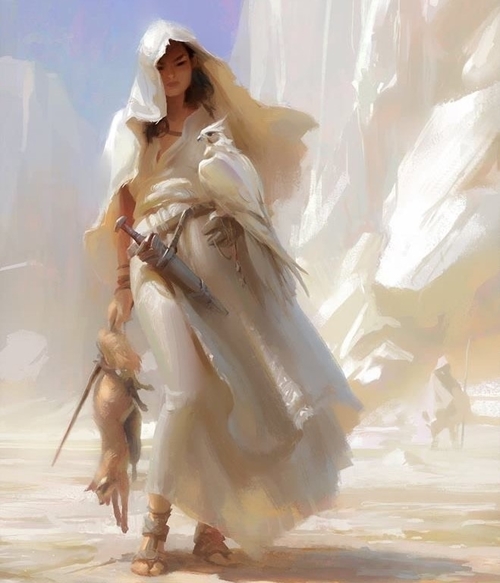
A Growing Cult | The Daughter of the Sands
Little is known about the figure that some of the Sultan's Sand Striders have taken to referring to as "The Daughter of the Sands," but encounters with her seem to be growing as time presses on. Some skeptics claim she is simply a wild woman who survives by traveling from oasis to oasis in the Living Waste, and occasionally travels back towards the Sultanate's border. Many Sand Striders have taken to the belief that she is an earth-bound goddess, claiming that they have seen her shifting the dunes with nothing but waves of her hand, and even turning into sand herself and sinking into the ground.
The soldiers' accounts also vary on what she looks like, but the two common descriptions stand out. The first describes a woman whose body is completely made of sand, as if she had become one with the Living Waste. The second is of a woman whose complexion matches the color of the dunes, wearing a stark white cloak and hijab which covers much of her face. She is said to have eyes with no irises, and the whites are the color of the moon. It's also been reported that her eyes faintly glow at night, with Sand Striders claiming they've been able to spot her in the distance due to the dim light.
The Sand Striders began worshipping her after some soldiers claimed she saved them during combat with the Hooved Folk, or from being lost in the intense sand storms that frequently occur on the Sultanate's border with the Living Waste. Those who revere her say she is a moon spirit, while others go as far as to claim she is a reincarnation of the Lunar Mantle.
While her existence is questionable, the growing number of Sand Striders who praise her is very real. Some border outposts have erected shrines to the mysterious being, while others have been harshly reprimanded and even expelled from the army for converting to a devilish heresy.
Magic in the Sultanate is tied heavily to government service, wealth and religion. It is essentially unheard of that a lowborn magus is ever able to channel their power into anything truly useful, and rarely will those born outside of the Sultanate's elite -- whether by way of royal blood or being born to wealthy merchants -- be granted entry to the country's magical institutions.
Those instances are only rare, though, and not unheard of.
The specific mechanics of magic are fairly well understood by the Sultan's Magi, as they have been studied it for centuries. It's unknown how exactly it is determined, but some magically capable mortals are naturally gifted in Solar magic or Lunar magic. In the early stages, they are only able to channel their magic during certain times of the day, Solar magic users, naturally, from sunrise to sunset, and Lunar magic users from sunset to sunrise. It is possible for someone to learn the magic type opposite their natural abilities, but they are often never able to achieve mastery.
In order to channel their power into anything beyond the simplest applications (such as lighting a candle or manipulating small amounts of water), magic users must have a vessel to channel their energies through. Most often magi prefer a staff or wand, but the vessel can be anything one can carry -- a sword, a book, and anything in between, though it is preferable for the item to be sturdy in order to avoid destruction. Any mundane item can serve as a vessel, given the user learns to perform specific rituals.
Moon magic vessels require the user to take their preferred item to a river (or any running body of water) immediately after sunset, fully submerge it, and allow droplets of their blood to drip into the water until sunrise. This bloodletting has resulted in serious injury and death, though the Sun magic method is not much safer. These magic users carry their implements into the dunes, and bury it. They shed their clothing and meditate on their burial spot, exposed to the sun's rays, from sunrise to sunset.
While more dangerous, it has proven beneficial for magic users to create their vessels in the appropriate season when the days or nights are longer, allowing them to channel greater powers. Magic users are able to create more than one vessel. It has been observed that creating a vessel near population centers has the ability to backfire and muddle the intended user's life energies with others, so most will avoid the risk by journeying into the wilderness to create their vessel.
Lunar magic typically allows its users to manipulate water, air, and ice. It allows users to see glimpses of the future, though these visions are often shrouded in mystic symbolism and metaphor. Moon magic users are, naturally, far more capable at night.
Solar magic is far less understood, but is known to allow users to manipulate earth and fire. It allows users to channel their magical power into raw energy, invigorating users with seemingly superhuman strength and speed. They are of course more powerful during the day. Due to the common stigma around Sun magic, it is extremely rare for anyone to achieve mastery. The Sultanate only entrusts its knowledge on Sun magic to a select few of its Magi, but in recent years has expanded that pool as many believe Sun magic may be crucial to understanding and stopping the Living Waste.
Magic is known to greatly harm the body with overuse, especially if great feats are attempted without a proper vessel. It is possible for a vessel to be destroyed while attempting a feat beyond a Magus's current capabilities. There is a sub-field of magical study which focuses on hunting down flora, fauna, and other ingredients which may expand one's magical abilities, but this primitive alchemy has only recently been established as the race to stop the Living Waste has intensified.
Those instances are only rare, though, and not unheard of.
The specific mechanics of magic are fairly well understood by the Sultan's Magi, as they have been studied it for centuries. It's unknown how exactly it is determined, but some magically capable mortals are naturally gifted in Solar magic or Lunar magic. In the early stages, they are only able to channel their magic during certain times of the day, Solar magic users, naturally, from sunrise to sunset, and Lunar magic users from sunset to sunrise. It is possible for someone to learn the magic type opposite their natural abilities, but they are often never able to achieve mastery.
In order to channel their power into anything beyond the simplest applications (such as lighting a candle or manipulating small amounts of water), magic users must have a vessel to channel their energies through. Most often magi prefer a staff or wand, but the vessel can be anything one can carry -- a sword, a book, and anything in between, though it is preferable for the item to be sturdy in order to avoid destruction. Any mundane item can serve as a vessel, given the user learns to perform specific rituals.
Moon magic vessels require the user to take their preferred item to a river (or any running body of water) immediately after sunset, fully submerge it, and allow droplets of their blood to drip into the water until sunrise. This bloodletting has resulted in serious injury and death, though the Sun magic method is not much safer. These magic users carry their implements into the dunes, and bury it. They shed their clothing and meditate on their burial spot, exposed to the sun's rays, from sunrise to sunset.
While more dangerous, it has proven beneficial for magic users to create their vessels in the appropriate season when the days or nights are longer, allowing them to channel greater powers. Magic users are able to create more than one vessel. It has been observed that creating a vessel near population centers has the ability to backfire and muddle the intended user's life energies with others, so most will avoid the risk by journeying into the wilderness to create their vessel.
Lunar magic typically allows its users to manipulate water, air, and ice. It allows users to see glimpses of the future, though these visions are often shrouded in mystic symbolism and metaphor. Moon magic users are, naturally, far more capable at night.
Solar magic is far less understood, but is known to allow users to manipulate earth and fire. It allows users to channel their magical power into raw energy, invigorating users with seemingly superhuman strength and speed. They are of course more powerful during the day. Due to the common stigma around Sun magic, it is extremely rare for anyone to achieve mastery. The Sultanate only entrusts its knowledge on Sun magic to a select few of its Magi, but in recent years has expanded that pool as many believe Sun magic may be crucial to understanding and stopping the Living Waste.
Magic is known to greatly harm the body with overuse, especially if great feats are attempted without a proper vessel. It is possible for a vessel to be destroyed while attempting a feat beyond a Magus's current capabilities. There is a sub-field of magical study which focuses on hunting down flora, fauna, and other ingredients which may expand one's magical abilities, but this primitive alchemy has only recently been established as the race to stop the Living Waste has intensified.
The RP in a nutshell
tl;dr - a low-magic world based heavily on cultures ranging from the Levant to Central Asia.
You and your fellow players will take on the roles of characters in the decaying Sheikdom of Mekhallah, the northeastern-most province in the Jamela Sultanate. It's not a good situation, either -- as the rapidly expanding badland known as the Living Waste continues to move south, large swaths of the sheikdom succumb to desertification. Farmers are forced to abandon their land, food is becoming a critical resource, and travel is difficult for an ill-prepared individual. At the beginning of your tale, the sheikdom's capital city, Alkhafat, will be the center of the Sultanate's attention as an important official arrives to either solve the issue or determine a way for the city to be evacuated. Your characters may even have a crucial role to play in that, but I'll emphasize your character is not bound to any central plot, and can pop in or out of certain events whenever they desire. I encourage you to talk with me about your character's goals so I can find ways to keep them tethered to the action, even if they are elsewhere.
I also encourage you to talk with me about possibilities outside of the framework I've laid down for you. Groups I have not included in lore that you feel would enhance the world are fantastic, and I'm willing to work with you to make them slide seamlessly into the world. I also encourage you to consider individual subplots to explore your character -- the squeaky wheel gets the grease, and I would love for my world's events, related to the main plot or no, to help your character really figure out something important about themselves.
This is a low-fantasy setting, so even if your character possesses some kind of magical talent, don't expect to be casting fireballs left and right. Magic takes decades of study in the most elite schools in the Sultanate to really master, so it's rare for the common man to ever unlock their potential even if they can cast.
Things are changing, though. The weird and supernatural seem to be encroaching into the Sultanate, slowly but surely.
The setting obviously borrows heavily from cultures from the Levant to Central Asia, so I encourage you to do some research in that direction if you want to come up with a super cool and easy to translate character concept, or just to find some dope outfits and weapons for your character to have. You're not bound to it though, you can certainly be a traveler from a far-distant land.
If any questions pop up as you're making a character (should we get that far) or at any time really, ask away. I've of course not covered the entirety of this world, and I encourage collaborative world building in areas I may have neglected.


